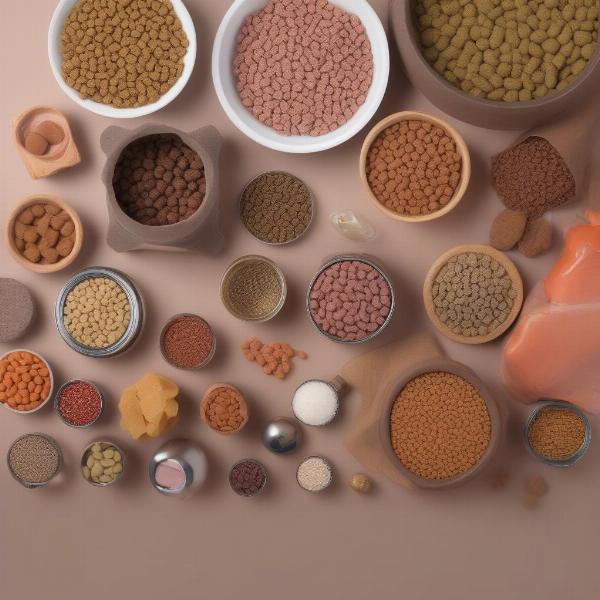Labrador dog food plays a crucial role in your furry friend’s overall health and well-being. Choosing the right food can be a daunting task, especially with so many options available. This guide will equip you with the knowledge you need to make informed decisions about your Labrador’s nutrition, ensuring they live a long, healthy, and happy life.
Understanding Your Labrador’s Nutritional Needs
Labradors are energetic and playful dogs known for their hearty appetites. Their nutritional requirements vary depending on their age, activity level, and overall health. Puppies require a diet rich in protein and calories to support their rapid growth, while adult Labradors need a balanced diet to maintain their ideal weight and energy levels. Senior Labradors benefit from a diet lower in calories and fat to prevent obesity and support joint health.
Key Nutrients for Labradors
- Protein: Essential for building and repairing tissues, protein should be the primary ingredient in your Labrador’s food. Look for sources like chicken, beef, lamb, fish, or eggs.
- Fat: Provides energy and supports healthy skin and coat. Choose healthy fats like those found in fish oil and flaxseed.
- Carbohydrates: Offer a source of energy. Opt for complex carbohydrates like whole grains and vegetables.
- Vitamins and Minerals: Essential for various bodily functions, ensuring a complete and balanced diet is key.
Choosing the Right Labrador Dog Food
With countless brands and formulas available, selecting the right food can be overwhelming. Consider these factors:
- Life Stage: Choose a formula specifically designed for puppies, adults, or seniors.
- Activity Level: Highly active Labradors require more calories than less active ones.
- Health Conditions: Certain health conditions, such as allergies or joint problems, may require specialized diets.
- Ingredients: Look for high-quality ingredients and avoid fillers, artificial flavors, and preservatives.
 Different Types of Dog Food
Different Types of Dog Food
Dry vs. Wet Food
- Dry Food (Kibble): Convenient, affordable, and promotes dental health.
- Wet Food (Canned): Higher in moisture content and palatability, but can be more expensive.
Feeding Your Labrador
Establishing a consistent feeding schedule is crucial. Divide your Labrador’s daily food allowance into two or three meals. Monitor their weight and adjust the portion size accordingly to maintain a healthy body condition. Avoid free-feeding, as it can lead to obesity.
How Much to Feed Your Labrador?
The amount of food your Labrador needs depends on various factors, including age, activity level, and metabolism. Consult the feeding guidelines on the dog food packaging or your veterinarian for recommendations.
Common Labrador Food Allergies
Labradors are prone to certain food allergies. Common allergens include beef, chicken, dairy, wheat, and soy. If you suspect your Labrador has a food allergy, consult your veterinarian. They can help diagnose the allergy and recommend an appropriate elimination diet.
Conclusion
Choosing the right labrador dog food is essential for your dog’s health and happiness. By understanding your Labrador’s nutritional needs and considering factors like life stage, activity level, and potential health conditions, you can select a food that will help them thrive. Don’t hesitate to consult with your veterinarian for personalized recommendations.
FAQ
- What is the best dog food for a Labrador puppy? A high-quality puppy food formulated for large breeds, rich in protein and calories.
- How often should I feed my adult Labrador? Twice a day is generally recommended.
- Can I feed my Labrador raw food? Consult with your veterinarian before switching to a raw food diet.
- What are the signs of a food allergy in Labradors? Itchy skin, ear infections, digestive problems, and excessive shedding.
- How can I prevent my Labrador from becoming overweight? Feed them a balanced diet, provide regular exercise, and avoid overfeeding.
- What is the best way to transition my Labrador to a new food? Gradually mix the new food with the old food over a period of several days.
- Should I give my Labrador supplements? Consult your veterinarian before giving your Labrador any supplements.
Related Articles:
About ILM Dog:
ILM Dog is your trusted international resource for expert advice on dog breeds, health, training, nutrition, grooming, and much more. We provide practical guidance for dog owners of all experience levels, helping you nurture the special bond with your canine companion. From choosing the right breed to ensuring their lifelong well-being, ILM Dog offers a wealth of information on dog care. Contact us for personalized advice: Email: [email protected], Phone: +44 20-3965-8624. We’re here to help you provide the best possible care for your furry friend.